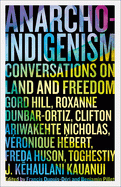Anarchists have much to learn from Indigenous struggles for decolonization. [A] thought-provoking collection Lesley J. Wood, Professor, York University, Toronto
"Vigorously affirming anarchism's plurality, the authors make a powerful case for the reconfiguration of anticolonial struggle" Ruth Kinna, Professor, Loughborough University
As early as the end of the nineteenth century, anarchists such as Peter Kropotkin and Élisée Reclus became interested in Indigenous peoples, many of whom they saw as societies without a state or private property, living a form of communism. Thinkers such as David Graeber and John Holloway have continued this tradition of engagement with the practices of Indigenous societies, while Indigenous activists coined the term 'anarcho-indigenism', in reference to a long history of (often imperfect) collaboration between anarchists and Indigenous activists, over land rights and environmental issues, including recent high profile anti-pipeline campaigns.
Anarcho-Indigenism is a dialogue between anarchism and Indigenous politics. In interviews, the contributors reveal what Indigenous thought and traditions and anarchism have in common, without denying the scars left by colonialism. They ultimately offer a vision of the world that combines anti-colonialism, feminism, ecology, anti-capitalism and anti-statism.
Francis Dupuis-Déri is a Professor of Political Science and a member of the Institut de Recherches et d'études Féministes at the Université du Québec à Montréal. He is the author of several books such as Who's Afraid of the Black Blocs?. Benjamin Pillet is a translator and community organizer, with a PhD in Political Thought from the Université du Québec à Montréal.
ANARCHO-INDIGENISM
CONVERSATIONS ON LAND AND FREEDOM
Precio: 22,00€
Sin stock, sujeto a disponibilidad en almacenes.
Editorial:
Coleccion del libro:
Idioma:
Castellano
Número de páginas:
160
Dimensiones: 198 cm × 129 cm × 0 cm
Fecha de publicación:
2023
Materia:
ISBN:
9780745349220



